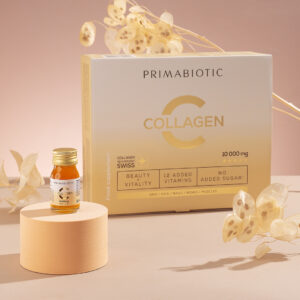There has been a lot of talk about the properties of collagen and growing numbers of people are opting for its supplementation. But can mums-to-be and breastfeeding mums benefit from it? Time to crack down on a subject that has been causing a great deal of doubt for a long time!
Pregnancy Vitamins and Supplements – What’s Really Essential?
Pregnancy is a period of increased nutritional needs. One of the nutrients whose consumption should be increased during pregnancy is protein. It contains amino acids essential for building up new fetal tissues and for maintaining proper maternal weight.
Guidelines for its daily recommended intake for pregnant women suggest increasing the amount of protein in the diet of mums-to-be to 1.20 g/kg of current body weight/day. For future mums, it’s source should be balanced diet, unfortunately, it is not always possible to balance it that way.
What is collagen?
Collagen is a protein that is naturally found in our body. It is the main component of connective tissue. Collagen influences the condition of skin and can affect the flexibility of epidermis.
It is also a building material for joints, cartilage, blood vessels, eye cornea and influences the production of synovial fluid. With age, the synthesis of endogenous collagen decreases, resulting in wrinkles, weakened hair and nails, as well as joint pain and increased tendency to fracture.
Collagen and Pregnancy – Is It Safe and Beneficial?
Taking collagen during this special period can act as a support for increased protein requirements. Collagen is a supply of amino acids, so while pregnant, it is important to ensure that it is not consumed in excessive amounts.
The recommended daily dose for pregnant and lactating women (from food as well as supplementation) is approximately 70-100 g per day.
Collagen and Breastfeeding – What You Should Know
Collagen is a protein naturally occurring in the body. Therefore, there is no contraindication to use collagen when a woman is breastfeeding. The recommended safe level of its additional intake for non-breastfeeding women during the first six months of lactation is 18-20 g/day, and for the period from six to 12 months postpartum, the recommended additional amount is 12.5 g/day.
Benefits of Taking Collagen While Pregnant
Proper collagen supplementation can result in many benefits including:
- Reduced stretch marks – Excess of oestrogens predisposes to deterioration of collagen fibres, which leads to the formation of stretch marks. Often, care and use of cosmetics are unfortunately insufficient. By supplementing collagen during pregnancy, skin regains its firmness and hydration, making stretch marks less visible during pregnancy.
- Strengthened hair and nails – Collagen provides essential amino acids that nourish nails and hair roots. They ensure their proper growth and revitalisation.
- Improved condition of joints and bones – Collagen is the main builder of bones and joints – both for mother and child. Taking collagen supplements also benefits production of joint fluid.
- Faster return to the pre-pregnancy figure – Proper collagen supplementation during pregnancy and during breastfeeding benefits and supports woman’s body return to her pre-pregnancy shape and figure.
Which Type of Collagen Is Best During Pregnancy?
- Hydrolysed collagen – is characterised by a high absorption rate, which is tied to low molecular weight peptides that are produced during the hydrolysis process.
- Natural collagen – women who are pregnant should reach for natural collagen, without artificial additives, preservatives, colourings, sweeteners or fillers.
- Liquid collagen – drinkable collagen is easily absorbed by the body.
- Enriched with vitamin C – The presence of vitamin C in the supplement’s composition is an additional advantage, as it is important for the synthesis of collagen.
Among the various types available, bovine collagen (derived from cows) stands out as a beneficial option during pregnancy. It’s rich in types I and III collagen – the same types naturally found in human skin, bones and ligaments. This makes it especially supportive for maintaining skin firmness (which may help reduce stretch marks), easing joint discomfort, and promoting overall tissue resilience.
One of the easiest and most effective ways to supplement bovine collagen during pregnancy is in liquid form. A drinkable collagen supplement is typically hydrolysed (broken down into peptides), making it easier for the body to absorb and use. It’s also gentle on digestion – an important consideration for mums-to-be.
An ideal choice for future and lacting mums would be the Primabiotic Collagen supplement. Its form is easily digestible, it fulfils all the above properties and, on top of that, it tastes insanely good!
Remember to always consult your doctor or midwife before introducing new supplements during pregnancy, but for many women, liquid collagen is a safe and supportive way to nourish their body from the inside out.
Collagen During Pregnancy – Recommended Dosage
It is assumed that the safe daily dose of collagen for women ranges between 2.5-15g, depending on the type of supplement and for what reason it is taken. Particular caution should be exercised by allergy sufferers or those with psoriasis, collagenosis or vasculitis.
In summary, collagen for pregnant and lactating women is safe. However, it is important to note that in order to use any supplementation during pregnancy and lactation, a consultation with a practitioner should be carried out beforehand.
See also other articles:
